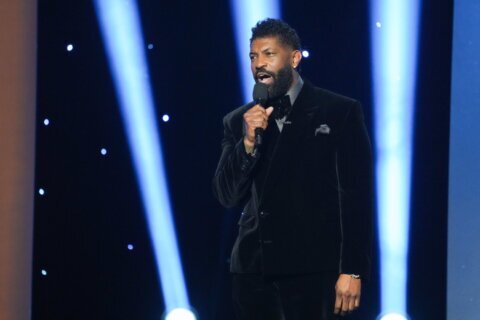You might call James Wan the hottest horror filmmaker today, but my money is on Mike Flanagan, who graduated high school in Maryland and studied film at Towson University.
After directing hits for the big screen with “Oculus” (2013) and “Doctor Sleep” (2019), Flanagan found a home at Netflix to adapt a pair of ghost novels into killer miniseries with both “The Haunting of Hill House” (2018) and “The Haunting of Bly Manor” (2020).
Now, he delivers an original work with “Midnight Mass,” a seven-episode miniseries of Biblical proportions that starts out as slow-burn suspense, making us think we’re watching an ex-con rehab show like “Rectify” with monsters stalking kids on bikes like “Stranger Things,” only to culminate with the best spiritual existentialism since “The Leftovers.”
Set in the remote community of Crockett Island, a disgraced young man, Riley Flynn (Zach Gilford), finishes his prison sentence for manslaughter and returns home to live with his devout mother (Kristin Lehman) and father (Henry Thomas of “E.T.”). They insist that he attend St. Patrick’s Church, but their Bible-thumping does little to persuade the agnostic.
His deepest spiritual conversations come with childhood sweetheart Erin Green (Kate Siegel, Flanagan’s wife), now a pregnant schoolteacher. Their discussion about what happens when we die is one of the best monologues in a series filled with them, as Erin describes her vision of heaven and Riley articulates brain synapses firing with memories.
Other standouts include Rahul Kohli as the Muslim Sheriff Hassan, Annabeth Gish as Dr. Sarah Gunning studying exploding vials of blood, Alex Essoe as Sarah’s dementia-suffering mother Mildred, Annarah Cymone as the mayor’s wheelchair-bound daughter Leeza Scarborough, and Robert Longstreet as the foolish town drunk Joe Collie.
(Hitchcock fans will love Collie’s “Rear Window” homage — “Is it because he liked ya?”)
As for the antagonist, Samantha Sloyan is sinister as Bev Keane, a controlling church leader who reads Bible verses in school and keeps poison in the supply closet. Her strict demeanor recalls Louise Fletcher’s Nurse Ratched in “One Flew Over the Cuckoo’s Nest” (1975), while her demonic devotion rivals Billie Whitelaw’s nanny in “The Omen” (1976).
Still, the best performance belongs to Hamish Linklater as charismatic young priest Father Paul Hill, the replacement for beloved Reverend Monsignor John Michael Pruitt, who left on a pilgrimage to the Middle East. At the pulpit, he spits hellfire and brimstone. In private, he speaks cautiously and carries himself gently like Anthony Perkins in “Psycho” (1960).
His cult of personality is a believable invitation to drink the Kool-Aid. His congregation is swayed by his handsome appearance, charming personality and uncanny ability to dissect their personal crises during Bible studies. He’s a man of the cloth to whom you’d willingly confess anything, even if he himself has more to confess than his churchgoers realize.
To say anything more would be sinful, but one can imagine Flanagan sitting in a pew taking communion during a twilight holiday service and dreaming up this twisted concept.
He brilliantly balances the miracles of Carl Theodor Dreyer’s “Ordet” (1955) with the Biblical terror of “Rosemary’s Baby” (1968), placing symbolic background clues (i.e. wall paintings), while crafting clever visual transitions between scenes, a technique he mastered in “Bly Manor” (elevating it to the level of “The Others” and “The Orphanage”).
While the pacing is old school, the delivery is modern, unleashing CGI winged monsters resembling archangels flying around the island, lurking outside of windows and luring kids into dark buildings. Thankfully, Flanagan picks precise moments to trigger out-of-your-seat jump scares, while tightly calibrating his tension for masterful suspense from start to finish.
Episode 1: “Genesis” is a slow burn, but stick with Episode 2: “Psalms.” You’ll be hooked by Episode 3: “Proverbs” and stunned by Episode 4: “Lamentations.” Episode 5: “Gospel” flips expectations in an “American Tragedy” rowboat, while all hell breaks loose in Episode 6: “The Acts of the Apostles” before ending rather profoundly in Episode 7: “Revelation.”
The fact that each episode is named after a book of the Bible has inspired countless think pieces. An atheist Vox columnist felt “betrayed” by the show’s embrace of religion (Did this writer never watch “The Exorcist?”), while an Atlantic columnist claimed the opposite by calling it a “morally urgent critique of how faith can fuel everyday cruelty and violence.”
“Midnight Mass” doesn’t tell us what to believe. The sinners and saints are both heroes and villains in a realistic flawed humanity. Its nuanced thesis is critical of organized religion but not of spiritual belief itself, allowing for supernatural beings but skeptical of Pharisee-style judgment, which is more in step with America than any self-righteous columnist.
Not only is it must-see this Halloween, it’s the best thing the genre has produced in years.
Holy Hell. What a show.








